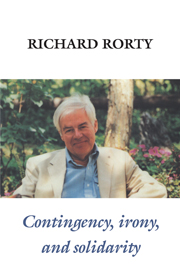1 - The contingency of language
Published online by Cambridge University Press: 05 June 2012
Summary
About two hundred years ago, the idea that truth was made rather than found began to take hold of the imagination of Europe. The French Revolution had shown that the whole vocabulary of social relations, and the whole spectrum of social institutions, could be replaced almost overnight. This precedent made Utopian politics the rule rather than the exception among intellectuals. Utopian politics sets aside questions about both the will of God and the nature of man and dreams of creating a hitherto unknown form of society.
At about the same time, the Romantic poets were showing what happens when art is thought of no longer as imitation but, rather, as the artist's self-creation. The poets claimed for art the place in culture traditionally held by religion and philosophy, the place which the Enlightenment had claimed for science. The precedent the Romantics set lent initial plausibility to their claim. The actual role of novels, poems, plays, paintings, statues, and buildings in the social movements of the last century and a half has given it still greater plausibility.
By now these two tendencies have joined forces and have achieved cultural hegemony. For most contemporary intellectuals, questions of ends as opposed to means – questions about how to give a sense to one's own life or that of one's community – are questions for art or politics, or both, rather than for religion, philosophy, or science.
- Type
- Chapter
- Information
- Contingency, Irony, and Solidarity , pp. 3 - 22Publisher: Cambridge University PressPrint publication year: 1989
- 9
- Cited by



